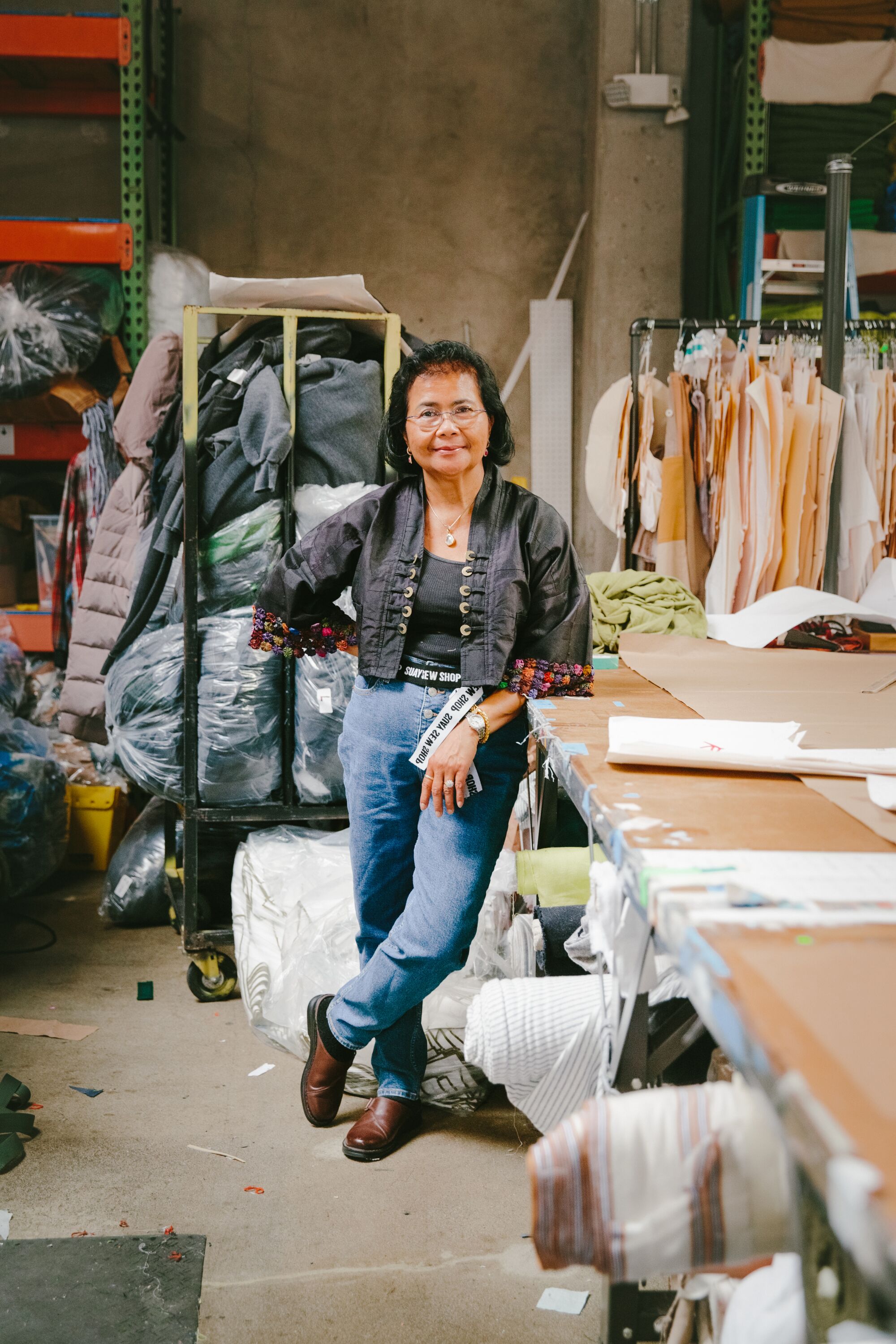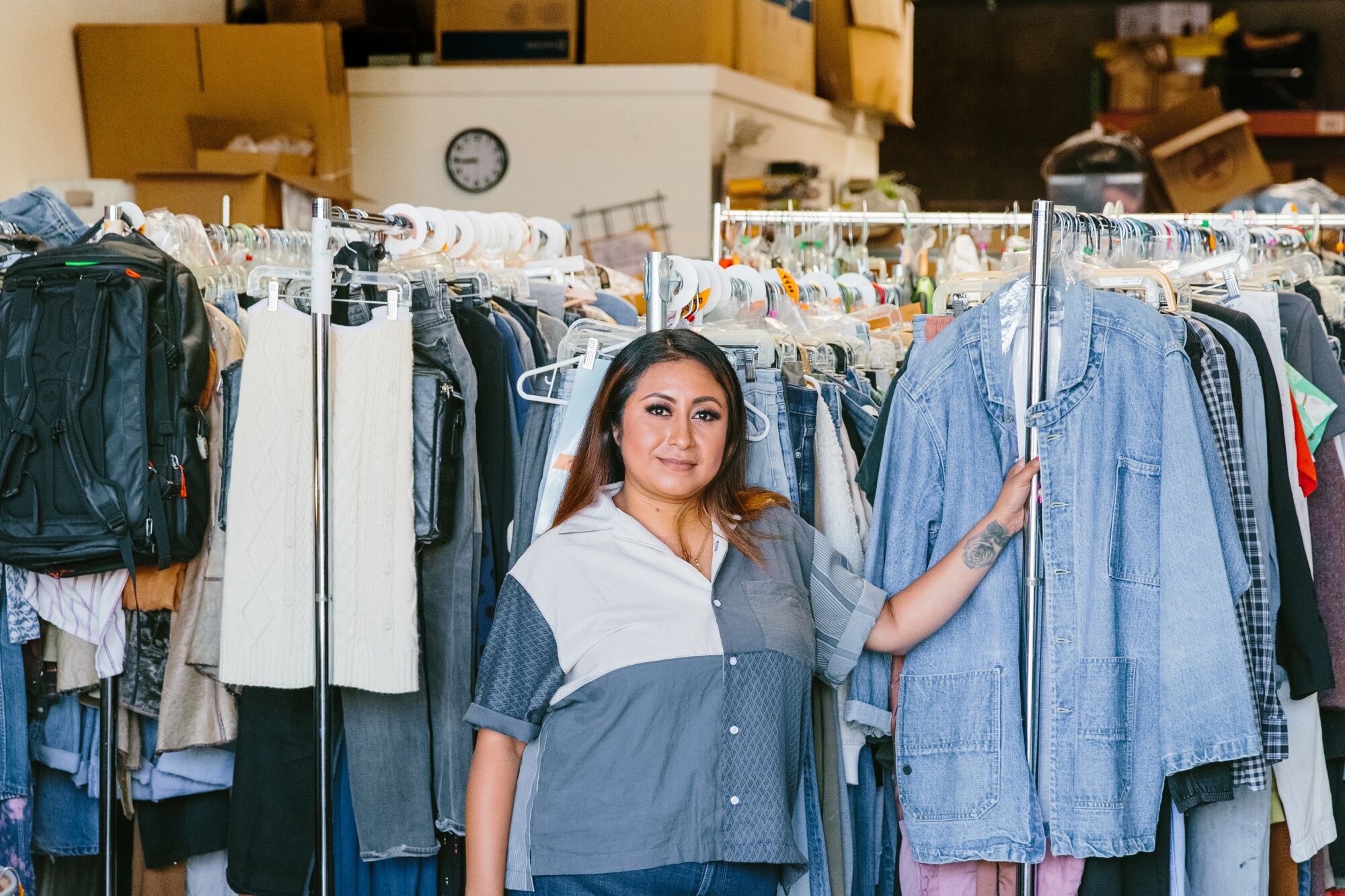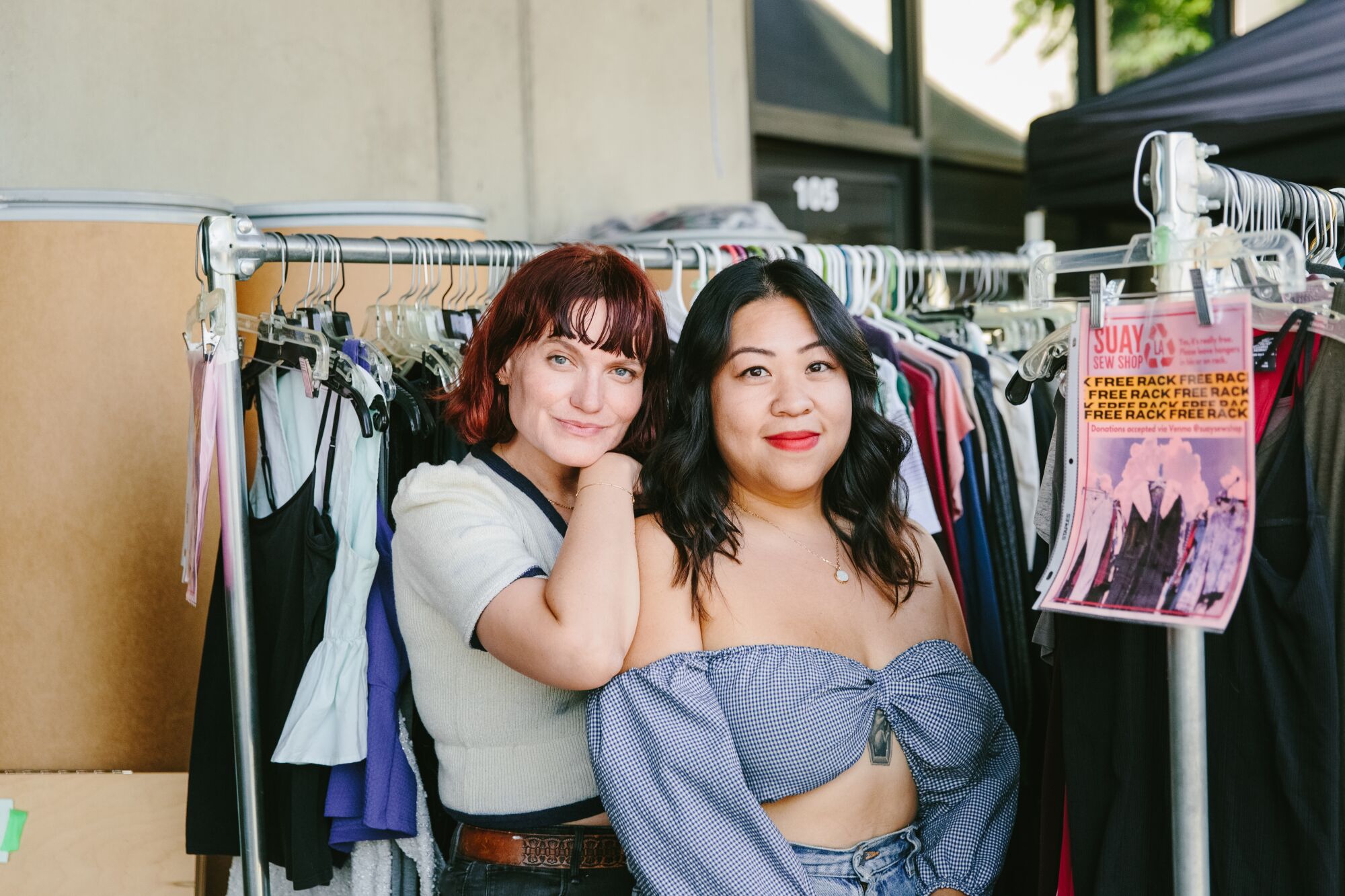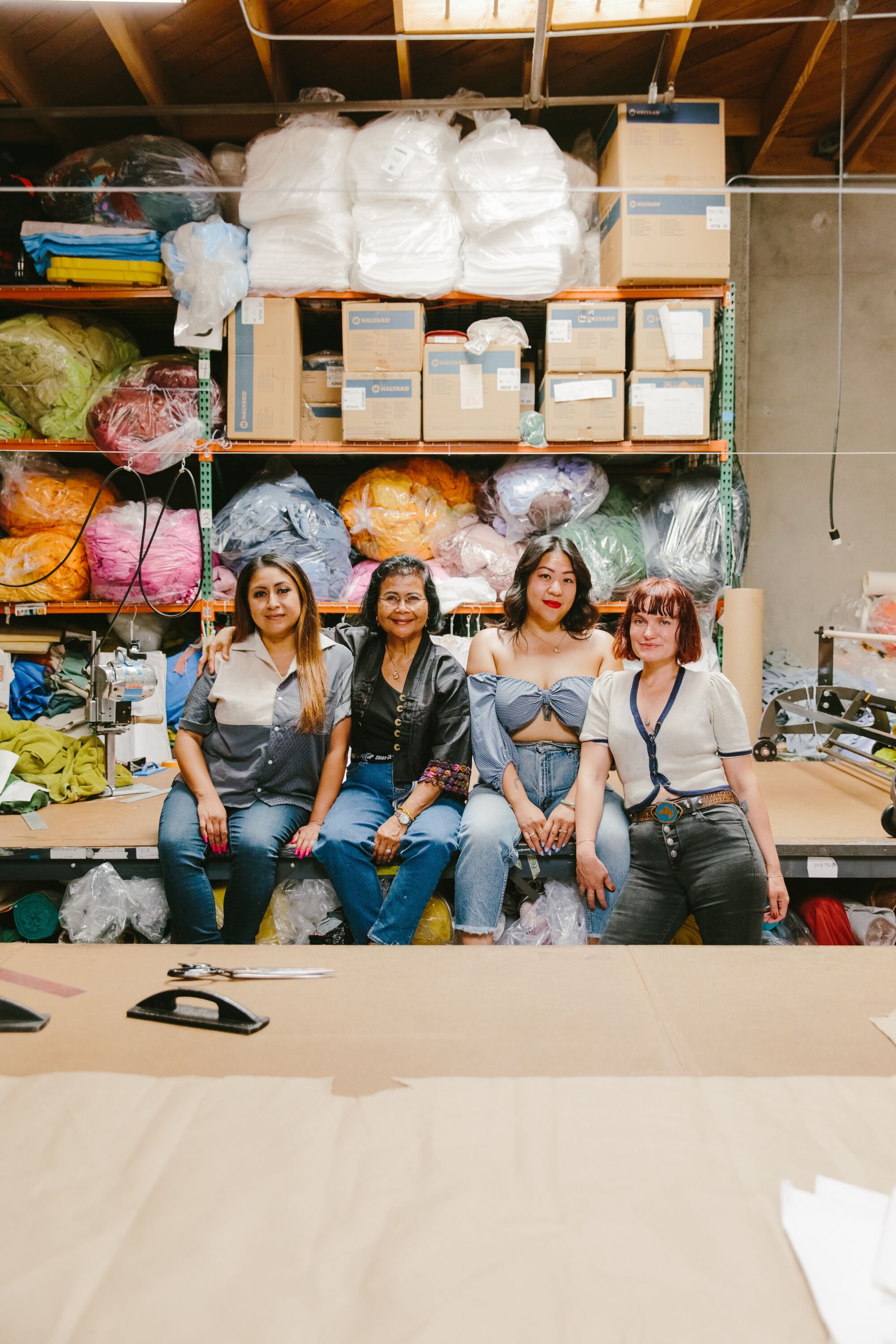How could the fashion industry be completely transformed?

This story is part of Image issue 13, “Image Makers,” a celebration of the L.A. luminaries redefining the narrative possibilities of fashion. Read the whole issue here.
Lindsay Rose Medoff is holding back tears. The CEO and lead designer of Suay Sew Shop, the Los Angeles-based sewing company, is at a vulnerable and yet empowering place. Have you ever tirelessly poured yourself into something with an unwavering belief that it’ll pay off? Have you ever found yourself doing everything, just because you believe in the good of it all? Day after day. Week in, week out.
Suay Sew Shop is attempting something that feels necessary: charting a new future of textile work that puts community first by giving most, if not all, back to its own community. Suay prides itself in taking care of its skilled employees. That begins with fighting against the exploitation ingrained in the labor workforce — particularly of brown and Black people, the majority of whom are immigrants — that has haunted sewing production companies for decades.
“I’m in an industry where predominantly the people that are producing clothing are marginalized communities, and immigrant communities. People are building their entire businesses off the backs of these communities, literally. They’re not being supported properly,” Medoff says. “The entire clothing system is based on cutting down labor [costs to] as little as possible. We’re going up against so much. We’re trying the most radical thing of giving back to our employees and to our community while committing to zero waste.”
Suay prides itself in taking care of its skilled employees. That begins with fighting against the exploitation ingrained in the labor workforce — particularly of brown and Black people, the majority of whom are immigrants — that has haunted sewing production companies for decades.
(James Michael Juarez/For The Times)
Founded in 2017, Suay Sew Shop is a sustainable sewing and production company, producing a range of items, from apparel to memory quilts to custom furniture upholstery, through the upcycling of donated textiles. Everything you can get your hands on at the retail store next door is 100% recycled and made on site. The fashion is anything but fast. (“Drop it fast and entirely,” Medoff told Time Out last year when she was selected as one of its “Women of the year.”) The pants, camp shorts, robes, beanies, crop tops, sweatshirts — everything is designed with longevity in mind. That’s the thing about Suay — its ethos is transformation: repair, redesign, reinforce, repurpose.
Its mission is to be of service to the community. That begins with its dedication to “circularity.” Through circular production — a system in which garments are recycled and remixed, over and over until their full life cycle is realized — Suay is showing that waste is a choice that doesn’t need to be made. Leading by example, it is offering the knowledge and resources for others to follow suit. Suay leads a monthly DIY initiative, in which people in the community can bring in clothing and have the team dye it. Suay has also partnered with a range of brands and groups, such as Patagonia, Kids of Immigrants and, soon the National Day Laborer Organizing Network, which will further amplify the importance of sustainability and community.
Suay is a model for transformation. “We’re constantly evolving and shifting for change of what the current climate and community requires of us,” Medoff says.

The future of fashion is what Suay Sew Shop is doing in the present day: choosing community over capitalism through circularity. That begins with the mother-daughter type of relationship of the two co-founders, Tina Dosewell and Medoff. The close-knit relationship of 18 years is felt through the shop. Medoff, who has a background in farming, ideates and implements community-driven initiatives and hunts down funding opportunities. Dosewell, the Suay matriarch, who is working through retirement, shares warmth and expertise throughout the warehouse. On any given day, she can be seen — often sporting a few Suay garments — offering affection and words of encouragement to everyone around the shop in between cutting and sewing a range of fabrics and textiles herself.

Tina Dosewell, the Suay matriarch, shares warmth and expertise throughout the warehouse.
(James Michael Juarez/For The Times)
Dosewell immigrated from Thailand to the U.S. in the late ‘80s, after having worked in sewing shops in her homeland. She met Medoff in 2004 in Los Angeles. They were both a part of the sewing community and gravitated toward one another naturally and instantly. Both were eager to learn from one another based on their respective backgrounds and offer the other as much support each could give. And, it’s only gotten truer and more impactful since Day 1. “It’s been so long; we even spoon in hotel rooms when we travel,” says Medoff.
“Suay” in Thai means “beautiful.” And the beauty comes through in the work that goes on under that banner. Suay specializes in repairing beloved garments and repurposing up to (thus far) 381 tons of diverted clothing coming from landfill, including a “combination of post-consumer waste, deadstock, and domestically, organically grown fibers” that’s gathered from community donations and corporate recycling. “I’m inspired by being able to make something beautiful from something someone threw away,” says Dosewell.
All the work is made by the laborers in Northeast L.A. from solely the items donated, continuing circularity. The women who represent and run Suay — more than three dozen first-generation Americans and immigrants from Latin American and Asian countries — are the faces of the shop and a representation of its ethos.

Head of Production Silvia Acevedo oversees day-to-day production.
(James Michael Juarez/For The Times)
Head of Production Silvia Acevedo oversees day-to-day production. Acevedo, a first-generation Mexican American, grew up in Los Angeles sewing shops and “fell in love” with this work after helping at her uncle’s business. Acevedo ’s sister, Mari Acevedo, also works at Suay. As opposed to working “like robots” as she felt she had at former sewing shops, Acevedo makes sure Suay works as a team, and that team includes everyone. “We strategize together. We ask one another what the other one may need help with. Our question to everything is, ‘How can we make it happen?’”
Director of Operations Anita Vuong, first-generation Vietnamese and Chinese American, also grew up in sewing shops alongside her mom, a hardworking sewer. She still can’t believe she works where she does: “It feels like magic to me,” she says. “I wish my parents had a place to work at like Suay when I was growing up — a place that’s communal and puts human rights first.”

Director of Operations Anita Vuong still can’t believe she works where she does: “It feels like magic to me.”
(James Michael Juarez/For The Times)
To Vuong, Suay is a drastic and refreshing, to the point of unbelievable, change from her past work experience. She’s worked in all corners of the industry, from production to manufacturing. “It all felt very unethical. Yeah, there are so many things that I loved about my jobs that I used to do, but I couldn’t live with myself knowing what was happening in this industry, knowing the cost of human lives. It’s the people at the factory who were the ones being taken advantage of. I didn’t want to be a part of that,” she says. “But here, human lives come first. We’re collectively doing something really wonderful for the planet; people are the planet.”

There’s something galvanizing about Suay’s mission, which is so far from the norm in the fashion industry it feels like it’s on another planet. All sewing shops operate differently. Practices, payment, working conditions are wildly exploitative and inconsistent. Some workers get paid minimum wages. Others are paid per piece, which creates conflict and competitiveness between the sewers. “That’s not good at all, because they’re already getting paid very little money as is,” Vuong says. “No one should ever have to fight for their livelihood in those ways.”
But Suay fosters the opposite kind of atmosphere. It really does feel like family. When, close to three years after Suay opened its doors, the COVID-19 pandemic hit, and hit brown and Black communities even harder. The shop quickly organized and reprioritized; it implemented initiatives that centered the most urgent needs of the community: safety and stability.
Suay partnered with national Indigenous organization Seeding Sovereignty to offer personal protective equipment to Indigenous communities, creating masks on site. Soon after, Suay worked alongside the Cleveland Clinic and the late Virgil Abloh to make breathable masks that filtered 99.4% of particles, with all proceeds being diverted to Cleveland Clinic to fund COVID-19 research. In 2020, during the height of the pandemic, Suay fed 200 garment families with its “Know Your Farmer” initiative, a food distribution program. Suay hopes to relaunch the program in the upcoming month, with the community being able to purchase community-supported agriculture boxes for families to support one another. The program will benefit Los Angeles’ garment workers, farm workers and day laborers.

For Medoff, going against the grain feels worth it, especially when you’re taking care of what matters most: your people.
(James Michael Juarez/For The Times)
It’s all about fashionand not about fashion at the same time. Seeing the bigger picture means giving back. Medoff believes that Suay can and should become bigger. Going against the grain feels worth it, especially when you’re taking care of what matters most: your people.
“We are making new things from the textiles people drop off and [are] circulating them back to the people. For a future of circularity, all you have to do is take the stuff that you’re not using anymore, reuse it and have a method for it. We’re doing that here; it’s just on a smaller scale,” Medoff says. “I really hope Suay, the model of Suay, becomes global.”
What could a truly sustainable fashion future hold? Medoff wants to challenge the conventions of scale. Fast fashion has been taken as gospel in the industry for too long. It’s time we reframed our thoughts in a way that benefits both a person and the planet. Medoff already knows of at least a few other clothing companies that have Suay Sew Shop pinned up on their moodboards for “inspiration.” But who will really be about it?
“It’s about being community-oriented and not accepting anything that will sacrifice what we have here,” Medoff says. “We need community, because that’s all we have and will have.”
Erika Ramirez is a writer, producer and content strategist. She’s the founder and editor-in-chief of ILY. She has held editorial positions at and contributed to media outlets such as Red Bull Media House, Billboard, Rookie, Elle, Vogue, Rolling Stone, NPR and Milk Studios. Ramirez is first-generation Mexican American and resides in Los Angeles.
Lettering design by Vivi Naranjo/For The Times; typeface: Goliagolia

More stories from Image




